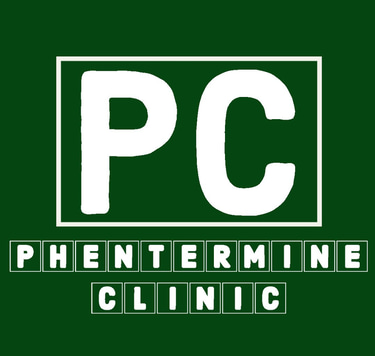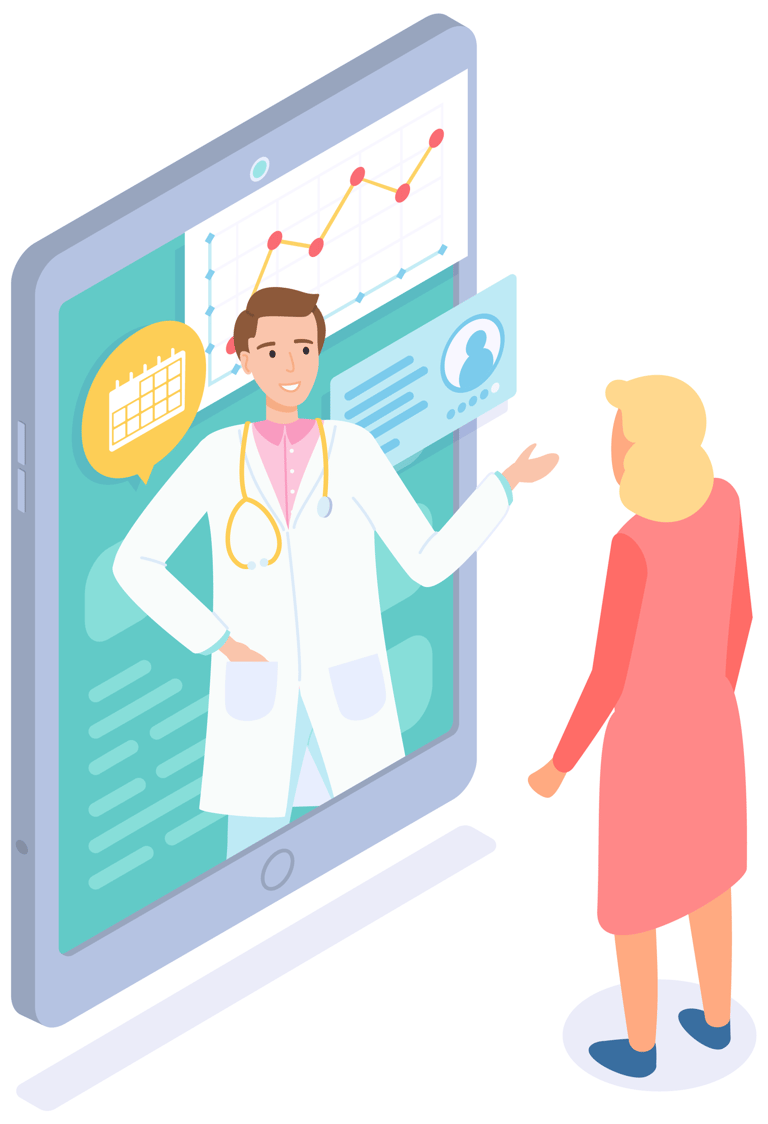Phentermine Clinic
GEORGIA
SEMAGLUTIDE & TIRZEPATIDE CLINIC
Are you finding it difficult to shed those extra pounds, even after trying various diets and exercise routines? Explore a revolutionary weight management approach at Georgia’s top Semaglutide & Tirzepatide clinic. We specialize in cutting-edge GLP-1 medications, such as Semaglutide and Tirzepatide, designed to support sustainable weight loss. This article will guide you through how our clinic can be your trusted partner in achieving lasting weight loss, offering tailored care, professional expertise, and proven treatment methods.


GLP-1 Medications
GLP-1 medications, including Semaglutide and Tirzepatide, represent a significant advancement in weight loss treatments. These medications function by mimicking the actions of the glucagon-like peptide-1 (GLP-1) hormone, which plays a vital role in controlling hunger, insulin release, and glucose levels. By enhancing these natural processes, GLP-1 medications help you feel satiated for longer periods, reduce food cravings, and improve your body’s glucose management, making them highly effective for weight loss.


COUNTIES we also serve :
Emanuel County
· Fayette County
· Stewart County
Semaglutide Weight Loss Treatment: What You Need to Know
How Semaglutide Works
Semaglutide is a GLP-1 receptor agonist that has been proven to aid in significant weight reduction when combined with a lower-calorie diet and increased physical activity. It works by slowing down the emptying of the stomach, reducing appetite, and increasing the feeling of fullness, making it easier to eat less and lose weight steadily.
Advantages of Semaglutide
Effective Weight Loss: Studies have shown that Semaglutide can lead to substantial weight loss, with some patients losing up to 15% of their body weight.
Better Metabolic Health: Beyond aiding in weight loss, Semaglutide helps improve blood sugar control and reduces the risk of type 2 diabetes.
Long-Term Results: Unlike quick-fix diets, Semaglutide offers a long-term solution for managing weight, helping you keep off the pounds for good.
Tirzepatide: A New Horizon in Weight Management
What Sets Tirzepatide Apart?
Tirzepatide is unique because it acts on both GLP-1 and GIP (glucose-dependent insulinotropic polypeptide) receptors. This dual action makes Tirzepatide more potent than Semaglutide, enhancing weight loss and improving metabolic health. It not only curbs your appetite but also boosts insulin sensitivity, making it a powerful tool for those battling obesity.
Tirzepatide’s Clinical Success
Recent research indicates that Tirzepatide can lead to even greater weight loss than Semaglutide, with some patients experiencing up to a 20% reduction in body weight. This makes Tirzepatide a promising option for individuals seeking an aggressive approach to weight loss.
The Value of Professional Guidance
Why You Need a Weight Loss Specialist
While GLP-1 medications like Semaglutide and Tirzepatide are highly effective, they should be administered under the supervision of a healthcare professional. Our weight loss clinic in Georgia ensures that you receive the correct dosage and ongoing monitoring to optimize benefits while minimizing any potential side effects.
A Comprehensive Support Network
Our clinic offers more than just medication. We provide a full support network designed to help you succeed, including nutritional counseling and exercise guidance. Our team is committed to supporting every aspect of your weight loss journey.
Convenient Access: Your Local Semaglutide Clinic
In-Person and Online Services
Whether you’re looking for a "semaglutide clinic near me" or prefer the convenience of online care, our Georgia-based clinic has you covered. We offer in-person consultations at our easily accessible location, as well as a full suite of online services for those who prefer remote care. Our semaglutide clinic online platform is easy to use, secure, and tailored to provide you with the best possible experience.
Flexible Scheduling
We know that life is busy, so we offer flexible appointment times, including evenings and weekends. Our goal is to make your weight loss journey as smooth and convenient as possible.
Conclusion: Begin Your Journey to a Healthier You
If you’re ready to take charge of your weight and transform your life, our Semaglutide & Tirzepatide clinic in Georgia is here to help. With advanced GLP-1 medications, personalized treatment plans, and a team of dedicated professionals, we provide everything you need to achieve your weight loss goals. Don’t wait—reach out to us today to schedule your consultation and start your journey to a healthier, happier you.
Expertise in Comprehensive Weight Management
Our Georgia-based weight loss clinic is dedicated to providing extensive weight management programs customized to meet individual needs. Our team of healthcare experts is skilled in the most current treatment options, ensuring you receive the best possible care. Whether you’re starting your weight loss journey or looking to maintain your progress, our clinic offers the guidance and support you need.
Tailored Treatment Plans
Recognizing that weight loss is a personal journey, our clinic offers individualized treatment plans designed to fit your unique health profile, lifestyle, and goals. Incorporating Semaglutide and Tirzepatide into your treatment plan can help you achieve and sustain meaningful weight loss results.
Convenient Location and Online Services
Searching for a "weight loss clinic near me"? Our clinic is conveniently situated in Georgia, making it easy to access our services. We also provide online consultations and follow-up sessions, allowing you to receive the care you need from the comfort of your home. Our semaglutide clinic online services are designed to accommodate your busy lifestyle, ensuring your weight loss journey is both convenient and effective.
SCHEDULE YOUR APPOINTMENT TODAY!
Join our community, ask other patients questions & get motivated. click here
Watch our weight loss videos
OUR STORY
Featured Video this week
What we don't prescribe
Vitamin B 12 alone: This is useless for weight loss. That's why we don't offer it to our patients. learn more
HcG :This is out rightly dangerous. We don't offer HcG in this clinic too. Learn more
What we do prescribe
Phentermine (Adipex-P, Ionamin, Pro-Fast),(in short supply in most pharmacies)
naltrexone-bupropion (Contrave),
Orlistat (Alli, Xenical),
Liraglutide(Saxaenda)
Diethylpropion (Tenuate Dospan)
GLP-1 medications : Smeaglutide,Tirzapetide etc
Text 8332330869
BE STRONGER THAN YOUR EXCUSES & BE THE BEST VERSION OF YOU
You didn’t come this far to stop.
Let the goal produce a plan
Do not accept excuses from yourself
Stop talking, start doing




Join our mailing list to receive current weight loss and health news, updates, and special offers. Click here
Obesity-related deaths
Obesity has reached epidemic proportions globally, with at least 2.8 million people dying each year as a result of being overweight or obese (World Health organization report) learn more
So our mission in Phentermine clinic is to empower everyone to reach their fullest potential. We meet that mission by making obesity treatment more accessible and affordable by innovating online weight loss care with the latest technology and user-friendly experiences. We are continuously committed to increasing access and efficiency of online weight loss treatment.
what is a phentermine clinic?
A Phentermine clinic is a medical facility where individuals can receive prescription medication for weight loss, specifically Phentermine. Phentermine is a prescription medication that is used as an appetite suppressant to aid in weight loss efforts. It works by affecting the central nervous system to decrease appetite.
These clinics are typically staffed by medical professionals such as doctors, nurse practitioners, or physician assistants who are trained to evaluate a person's health and determine if Phentermine is an appropriate option for them. They usually provide a comprehensive weight loss program that includes not only the medication but also dietary guidance, exercise recommendations, and regular check-ins to monitor progress and address any concerns.
It's important to note that Phentermine is a controlled substance due to its potential for abuse and dependency. As a result, its use should be closely monitored by a medical professional. Before considering a Phentermine clinic, it's advisable to consult with your primary care physician to discuss your weight loss goals and explore all available options.
Keep in mind that medical practices and regulations can vary by location and over time, so it's recommended to do thorough research and ensure that any clinic you consider is reputable, licensed, and follows proper medical guidelines.
Can I get phentermine from an online doctor?
Phentermine is a prescription medication that is typically prescribed for short-term weight loss management. It is classified as a controlled substance due to its potential for abuse and dependency. Because of this classification, regulations around its prescription and dispensation are quite strict.
In some cases, online doctors or telemedicine services might be able to prescribe phentermine, but there are usually several requirements that need to be met. These might include:
1. Medical Evaluation:
Most responsible healthcare providers will require a comprehensive medical evaluation before prescribing phentermine. This could involve providing your medical history, undergoing a physical examination, and possibly undergoing certain tests.
2. Patient Eligibility:
Phentermine is generally prescribed to individuals who are obese and have not been able to lose weight through diet and exercise alone. Eligibility criteria can vary, but it's often prescribed to individuals with a body mass index (BMI) of 30 or higher.
3. Doctor-Patient Relationship:
Many healthcare providers will require an established doctor-patient relationship before prescribing medications. This might involve multiple interactions with the doctor over a period of time.
4. State and Federal Regulations:
The prescription of controlled substances is subject to state and federal laws. Online doctors must adhere to these regulations, which might vary from one location to another.
5. Follow-up and Monitoring:
Regular follow-up appointments and monitoring might be required to assess the effectiveness of the medication and any potential side effects.
6. Healthcare Provider Policy:
Each healthcare provider or telemedicine platform will have its own policies and procedures regarding the prescription of phentermine or any other medication.
It's important to note that using phentermine without a proper prescription can be dangerous and illegal. Always consult a licensed healthcare provider before starting any prescription medication, and make sure to provide them with accurate and complete information about your health.
Keep in mind that the information I provided might have changed after September 2021. Regulations and practices regarding online healthcare services can evolve, so it's recommended to check with reputable online healthcare providers or consult local medical authorities for the most up-to-date information..
What foods should I eat while taking phentermine
It's crucial to consult with a healthcare provider for personalized advice based on your specific health condition and needs.
Phentermine is a prescription medication often used to help with weight loss. While taking phentermine, here are some general dietary recommendations:
1. Balanced Diet:
Focus on a balanced and nutritious diet that includes a variety of foods from all major food groups, such as lean proteins, whole grains, healthy fats, fruits, and vegetables.
2. Lean Proteins:
Include sources of lean protein in your meals, such as chicken, turkey, fish, tofu, beans, lentils, and low-fat dairy. Protein can help you feel fuller for longer and support muscle maintenance.
3. Whole Grains:
Choose whole grains like brown rice, quinoa, whole wheat bread, and whole grain pasta over refined grains. Whole grains provide more nutrients and fiber, which can aid in satiety.
4. Fruits and Vegetables:
Incorporate a variety of colorful fruits and vegetables into your diet. These foods are rich in vitamins, minerals, and fiber that can support overall health.
5. Healthy Fats:
Include sources of healthy fats, such as avocados, nuts, seeds, and olive oil. These fats can help keep you satisfied and support essential bodily functions.
6. Fiber:
Foods high in fiber, like whole grains, fruits, vegetables, and legumes, can help you feel full and regulate digestion.
7. Hydration:
Drink plenty of water throughout the day. Staying hydrated is important for overall health and can also help manage appetite.
8. Portion Control:
Pay attention to portion sizes to avoid overeating. Phentermine can suppress appetite, but it's still essential to practice portion control for sustainable weight loss.
9. Avoid Highly Processed Foods:
Minimize the consumption of highly processed foods, which can be high in unhealthy fats, sugars, and empty calories.
10. Limit Sugary Foods and Beverages:
Cut back on sugary foods and drinks, as excessive sugar intake can hinder weight loss efforts.
11. Caffeine Intake:
Some people experience increased sensitivity to caffeine while taking phentermine. If this applies to you, consider moderating your caffeine intake.
12. Regular Meals:
Aim to have regular meals and snacks throughout the day to maintain steady energy levels and avoid extreme hunger.
Remember, individual responses to medications and dietary changes can vary. It's important to discuss your dietary plans and any concerns you have with your healthcare provider before making significant changes to your diet while taking phentermine. They can provide personalized guidance based on your medical history and needs.
What Is The Difference Between Phentermine and Adipex?
Phentermine and Adipex are both medications used to aid in weight loss, but there is a distinction between the two.
Phentermine:
1. Phentermine is a generic medication that falls under the category of appetite suppressants. It is chemically similar to amphetamines and works by affecting the central nervous system to suppress appetite.
2. Phentermine is typically prescribed as part of a comprehensive weight loss program that includes diet, exercise, and behavioral changes.
3. It is approved for short-term use (usually a few weeks) due to concerns about potential side effects and the risk of dependency.
4. Phentermine is available in various forms, including tablets and extended-release capsules.
Adipex:
1. Adipex is a brand name for a specific formulation of phentermine. It contains phentermine hydrochloride as the active ingredient.
2. Adipex is often used as a short-term treatment for obesity in conjunction with lifestyle changes.
3. Since Adipex is a brand name, it can be more expensive than generic phentermine.
4. Adipex is available in different dosages, and the appropriate dosage is determined by a healthcare provider based on individual needs.
In summary, the main difference between Phentermine and Adipex is that Adipex is a brand name for a specific formulation of phentermine, while phentermine refers to the generic medication. Both medications are used for weight loss by suppressing appetite, but they may vary in terms of dosages, formulations, and costs. It's essential to consult a healthcare professional before using any weight loss medication to determine the most suitable option for your individual circumstances.
How does your diet affect your memory?
Diet can have a significant impact on memory and cognitive function. Certain nutrients and dietary patterns are linked to better cognitive health, including memory. Here are some ways in which diet can affect memory:
1. Antioxidants:
Diets rich in antioxidants, such as vitamins C and E, can help protect brain cells from oxidative stress and inflammation. Berries, nuts, seeds, and leafy greens are good sources of antioxidants.
2. Omega-3 Fatty Acids:
These healthy fats, found in fatty fish (like salmon), flaxseeds, and walnuts, are essential for brain health and have been associated with improved memory and cognitive function.
3. B Vitamins:
B vitamins, especially B6, B9 (folate), and B12, play a role in brain health and cognitive function. They are involved in the production of neurotransmitters that affect mood and memory.
4. Healthy Fats:
Consuming healthy fats, such as those found in avocados, olive oil, and nuts, can support brain health by providing essential fatty acids that help with the structure and function of brain cells.
5. Curcumin:
Curcumin, a compound found in turmeric, has been linked to improved memory and may help reduce the risk of cognitive decline.
6. Low-Glycemic Diet:
Diets that are low in refined sugars and have a low glycemic index may help maintain stable blood sugar levels, which is important for brain health. High and fluctuating blood sugar levels can impair memory and cognitive function.
7. Mediterranean Diet:
This diet, rich in fruits, vegetables, whole grains, lean protein, and healthy fats, has been associated with a reduced risk of cognitive decline and improved memory in older adults.
8. Hydration:
Staying adequately hydrated is crucial for brain function. Dehydration can impair cognitive performance and short-term memory.
9. Reducing Processed Foods:
Diets high in processed foods, sugary snacks, and unhealthy fats may have a negative impact on cognitive function over time. These diets can contribute to inflammation and oxidative stress.
10. Moderation and Variety:
Eating a balanced and varied diet that includes a wide range of nutrients can help ensure your brain receives the necessary building blocks for optimal function.
It's important to note that while a healthy diet can support memory and cognitive function, it's just one aspect of overall brain health. Regular physical activity, adequate sleep, stress management, and staying mentally active also play vital roles in maintaining cognitive function as you age. If you have specific concerns about memory or cognitive function, it's recommended to consult a healthcare professional.
what are diet pills
Diet pills, also known as weight loss pills or slimming pills, are types of supplements or medications designed to aid in weight loss. They are intended to help individuals lose weight by either reducing appetite, increasing metabolism, or interfering with the body's ability to absorb certain nutrients. It's important to note that the effectiveness and safety of diet pills can vary widely, and their use should be approached with caution and under the guidance of a healthcare professional.
There are several types of diet pills with different mechanisms of action:
1. Appetite Suppressants:
These pills work by reducing feelings of hunger, which can lead to decreased food intake and calorie consumption.
2. Fat Burners:
These pills claim to increase metabolism or the rate at which the body burns calories, often by affecting hormones or the nervous system.
3. Fat Absorption Inhibitors:
These pills aim to prevent the body from absorbing dietary fats, leading to a decrease in calorie intake.
4. Carb Blockers:
These pills are designed to interfere with the digestion and absorption of carbohydrates, potentially reducing calorie absorption.
5. Thermogenics:
These pills increase body temperature, which in turn can increase calorie expenditure. They often contain ingredients like caffeine.
6. Diuretics:
Diuretic diet pills promote water loss from the body, which can lead to temporary weight loss. However, this is not fat loss and can lead to dehydration.
It's important to exercise caution when considering the use of diet pills:
- Safety:
Many diet pills are not regulated as strictly as prescription medications, so their safety and efficacy can't always be guaranteed. Some ingredients in diet pills can have adverse effects, especially when taken in combination with other medications or underlying health conditions.
- Health Risks:
Some diet pills can cause side effects such as increased heart rate, high blood pressure, digestive issues, insomnia, and even more serious health concerns.
- Short-Term Results:
Even if some diet pills lead to short-term weight loss, they are rarely a sustainable solution for maintaining a healthy weight.
- Lifestyle Changes:
Long-term weight management and overall health are best achieved through a balanced diet, regular physical activity, and healthy lifestyle choices.
If you are considering using diet pills, it's recommended to consult with a healthcare professional before starting any weight loss regimen. They can help you assess the potential benefits and risks, provide guidance on safe options, and develop a comprehensive plan for achieving your weight loss goals.












